“If we fail to harness the potential of youth for peace and sustainable development today, we are basically nurturing marginalization, further mistrust and even radicalization in the future, when we could have empowered generations of peacemakers.” - Forest Whitaker, March 8, 2019
In early March 2019, Forest Whitaker visited Geneva to advocate for youth empowerment, accompanied by young peacebuilder from South Sudan, Magdalena Nandege, member of the Whitaker Peace & Development Initiative (WPDI). Together they participated in a series of events with Interpeace, in the context of the UN Human Rights Council and the
Geneva International Film Festival and Forum on Human Rights (FIFDH), addressing the need to invest in youth for sustainable peace.
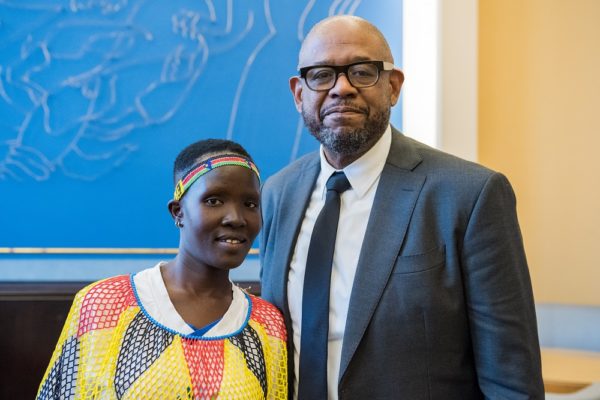
WPDI works with former child soldiers in post-conflict countries like Uganda, with youth in conflict-affected regions like South Sudan and with former gang members in Mexico and South Africa. Their methodology values the importance of working within communities, fostering local ownership and inclusion – peacebuilding principles that are at the core of Interpeace’s DNA.
We are proud to have joined forces with WPDI to advocate for youth leadership and promote peacebuilding approaches that have proven to be effective during Interpeace’s 25 years of experience.
A call for the international community to make transformative change
President of Interpeace, Scott M. Weber, was joined by Actor, Director and Founder of the Whitaker Peace & Development Initiative (WPDI), Forest Whitaker, at the Association of Correspondents to the United Nations in Geneva on March 8, 2019. Together they made a global call to action, urging governments, the private sector and civil society to invest resources and funds to specifically mobilize young people in the service of peace and reconciliation in their communities.
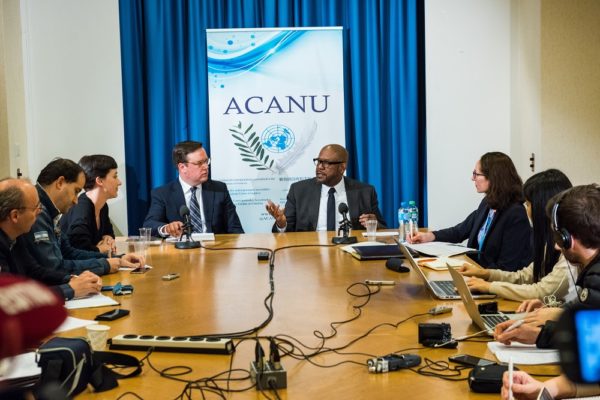
Although half of the world’s population is under 30, the role of youth leadership in peacebuilding processes remains largely unrecognized and unacknowledged. Forest Whitaker expressed that too often youth are seen as the problem and not enough as part of the solutions. Notwithstanding, young people are working collectively and independently for peace and sustainable development in many conflict-affected regions: “I created WPDI precisely because I view young women and men as doers, as potential partners in the creation of positive change who deserve to be supported, trained and accompanied.”
A strong commitment from the international community is needed to invest in the capacities and agency of young women and men. Scott M. Weber added, “Young people want to be heard, they want to be part of the decisions that affect them, their communities, and their countries – they have an immense ambition for action that we must put to the service of peace. We must go beyond the current ad-hoc efforts and achieve the catalytic scale to make real, transformative change happen.”
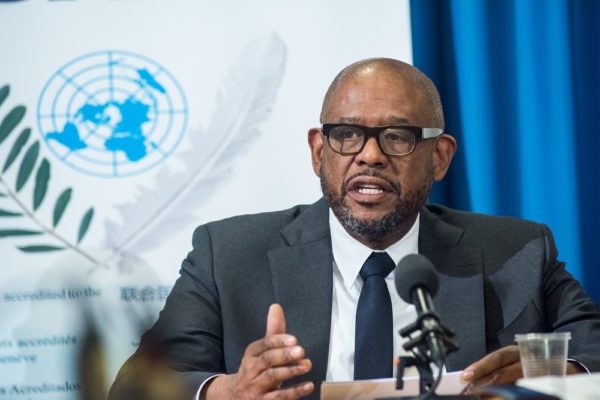
Efforts to build on youth leadership in contexts like South Sudan are essential for sustaining peace
Following the Press Conference, Forest Whitaker and Scott M. Weber were joined by Magdalena Nandege, and representatives of UNHCR and the Permanent Missions of Switzerland and the Netherlands in a Human Rights Council Side Event, to discuss the peacebuilding issues in South Sudan.
South Sudan is not only the youngest country in the world, it is also one of the poorest. Internal conflict has caused nearly 380,000 deaths and more than 2.4 million displaced. The panel discussion addressed the strategies and actions that are needed to ensure peace and prevent human rights violations in the long term.
"We have to go to the grass roots to understand the problem or implement a programme. Find out who are the conflicting people, who are the trusted people and work with them. You need to adapt and put yourself at the level of people you talk with." Magdalena Nandenge, South-Sudanese midwife and peacebuilder working for WPDI, asserted the importance of investing on local capacities for resilience. As a 25-year old, Magdalena is a clear example of how the international community must rely on the dedication and courage of young people living in conflict. “From the very beginning to the very end, there needs to be a partnership with the community,” Forest Whitaker added.
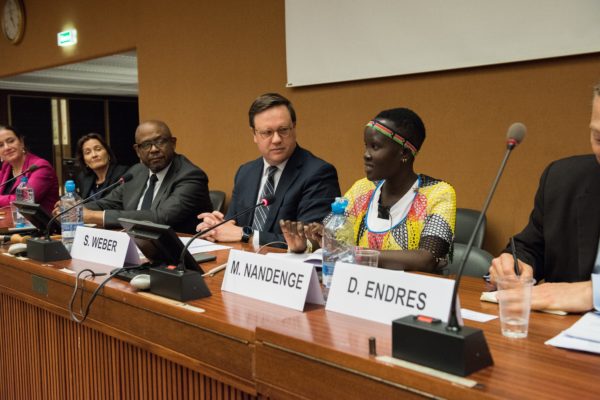
The conversation continued the next day, at the Geneva International Film Festival and Forum on Human Rights (FIFDH), in an event co-hosted by Interpeace: “South Sudan: World’s Youngest Nation at the Crossroads to Peace”.
"In South Sudan young people make up over 70% of the population, but they are marginalized. They are not included in decision-making in their communities.” Scott M. Weber was the moderator of this event with Forest Whitaker and Magdalena Nandege as the panelists.
A short film was screened, illustrating the work WPDI has done in South Sudan to empower youth with peacebuilding and conflict management skills, to help build a peaceful network of young leaders who have the ability to strengthen their communities. "Youth are trained to be leaders. We help them see the problems and be able to act on them. Trauma work is a key focus to deal with the conflicts they are facing," explained Forest Whitaker.
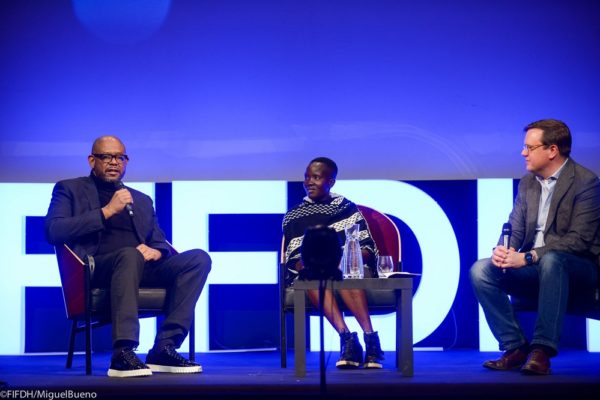
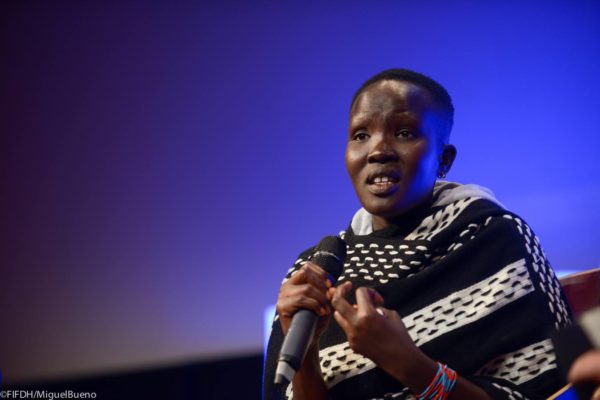
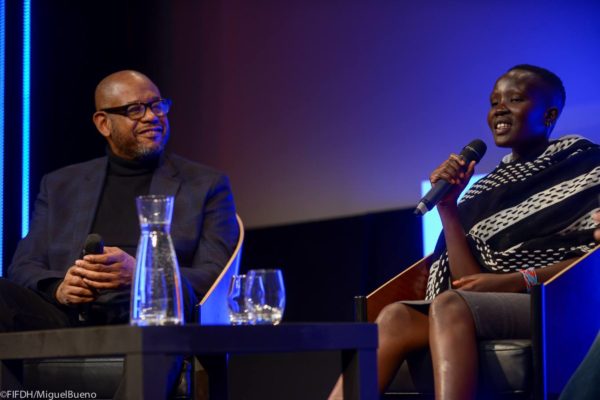
FIFDH panel event. Photo credit: FIFDH/MiguelBueno
A powerful discussion was undertaken, emphasizing the need to focus our attention to preventing the violence of exclusion, by empowering youth living in conflict. The factors of exclusion will push or pull individuals to engage or reject their community, and as a result the international community must seek to design and implement approaches that are inclusive and locally-owned.
Investing on our collective future
WPDI and Interpeace recognize the growing evidence base that shows that the empowerment of young people is the key factor to peace in many of the most fragile and conflict-affected settings in the world today. As a result, we encourage a transformative change to the way we engage young people in peace and development. This is particularly critical across Sub-Saharan Africa where 71% of the population is under the age of 29.
Interpeace was privileged to stand besides WPDI Founder, Forest Whitaker and peacebuilder Magdalena Nandgege, promoting a collective shift in the way we perceive young people and invest in them and their agency to build long-term sustainable peace.
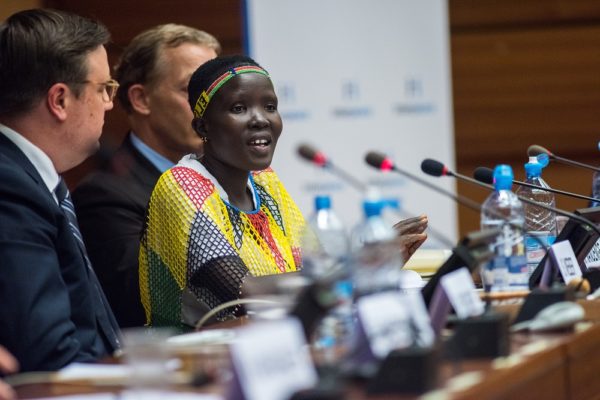
Watch the full event held at FIFDH on March 9, 2019 -
Interpeace is honoured to share a high-profile platform today – International Women’s Day 2019 – with a remarkable young woman and peacebuilder, Magdalena Nandege. Our event focusses on peacebuilding and human rights in South Sudan; our venue and audience is the Human Rights Council at the United Nations in Geneva; our practical call for meaningful action beyond words is that young women and men must be able to play a full role in building peace and development.
Magdalena is 25 years old and is both a midwife and a peacebuilder with the Whitaker Peace and Development Initiative (WPDI), promoting women’s empowerment and peace by passing on her skills and being an inspiration to others. She exemplifies how all levels of society – from local communities to the decision-making halls of the UN – can benefit practically from having women’s experiences, knowledge and passion at the heart of peacebuilding.
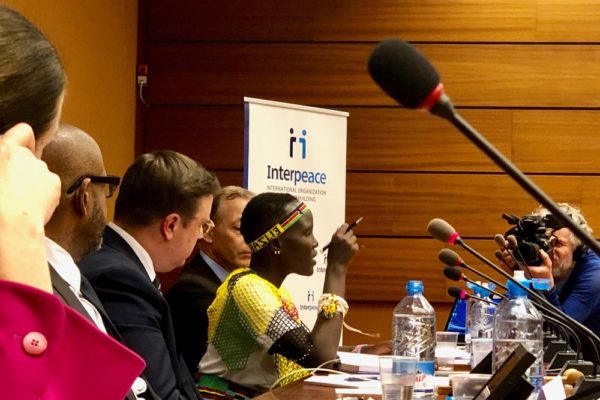
Interpeace’s recent work in Burundi has reinforced the importance and relevance of viewing peacebuilding through gender lenses. It has questioned gender stereotypes and ensured that our future peacebuilding is sensitive to vital gender nuances that take into account other aspects of women's identities. That said, more needs to be done worldwide: all too often efforts are made to ensure the participation and representation of women in peacebuilding process design, and yet women’s particular needs and interests too rarely then emerge at the forefront of peacebuilding delivery.
Everyone has a role to play to ensure that there is genuinely a better balance in the roles, responsibilities and benefits for women through peacebuilding – so that peacebuilding itself is better. #BalanceforBetter. Interpeace is playing its part: we remain resolutely committed and are practically implementing gender sensitive programming at all levels: from project design to practical implementation, from our work in the field to our work in the corridors of international rule setting and policy making. We are also committed to continuing our own institutional journey to achieve staff gender parity. We celebrate the progress achieved even as we recognise the need to do much more, and we celebrate especially the role and potential of young women worldwide.
Scott M. Weber
President of Interpeace and International Gender Champion
Interpeace held discussions with representatives of Zimbabwe’s Parliament, State authorities and civil society during 2018 in order to assess if and how Interpeace’s peacebuilding approaches and experiences might support all Zimbabweans. The guiding considerations for these discussions were Zimbabwe’s stated national development goals and strategies combined with Interpeace’s mission.
Specifically, Interpeace held consultations in Zimbabwe during 2018 with representatives of the National Peace and Reconciliation Commission; the Parliamentary Committee on Youth, Sports and Reconciliation; the Special Adviser to the President on Peace and Reconciliation; and, representatives of civil society, church bodies and youth. These consultations were received positively and were further encouraged by all concerned. They enabled Interpeace to gain an understanding of the current opportunities and challenges in Zimbabwe from the perspectives of a broad range of actors – just as Interpeace does in all its programme development initiatives.
The consultations were undertaken in line with Interpeace’s well-founded ‘Track 6’ approach: engaging at Track One level with government representatives and senior officials; Track Two level with civil society; and Track Three level with grassroots actors. Insofar as civil society is concerned in particular, Interpeace held a series of reflective and analytical consultations with a cross-section of civil society representatives. One of these consultations was held at Wild Geese Lodge in December 2018. From all of the discussions across all levels emerged a shared understanding of the needs and possible steps to be taken by Interpeace in collaboration with all actors in order to foster sustainable peace and development in Zimbabwe.
Interpeace’s work continues to be inclusive, participatory, and transparent.
We are pleased to announce Interpeace’s incoming-Governing Board member, Staffan de Mistura, Former Under-Secretary-General and United Nations Special Envoy for Syria, Afghanistan, Iraq and Lebanon.
The Interpeace Governing Board is the highest decision-making body of the organization and plays a key role in defining Interpeace’s overall strategy. Chaired by Monica McWilliams, the Governing Board is made up of prominent individuals from the government, international and business sectors. De Mistura’s 40-year career in various United Nations agencies and his experience working in many of the most conflict-affected regions of the world will be a great asset to the organization. He will officially join the Governing Board in June 2019.
“We are most grateful to be able to benefit from his deep experience and wisdom”, expressed the President of Interpeace, Scott M. Weber.
Over four decades of experience in the United Nations
Staffan de Mistura is a long-serving Italian-Swedish diplomat and former member of the Italian government. In July 2014, Former UN Secretary General Ban Ki-Moon, appointed De Mistura as the UN Special Envoy for Syria. His previous UN posts included, UN envoy in Afghanistan in 2010-2011 and in Iraq in 2007-2009. He was also the UN Secretary-General’s Personal Representative for Southern Lebanon in 2001-2004.
De Mistura began his UN career in 1971 as a World Food Programme project officer in Sudan. Throughout the years, he was given special humanitarian assignments in Dubrovnik, Sarajevo, Sudan, Ethiopia, Vietnam and Rwanda. He also served as the Director of the UN Information Centre in Rome, Director of Fundraising and External Relations of the UN Office of the Coordinator for Afghanistan and held a variety of senior posts with Unicef.
A lifetime dedicated to building peace
His career has been marked by a number of high-profile roles as an international mediator seeking to build understanding and end war. Under challenging conditions, Staffan de Mistura has promoted political dialogue, has been involved in overseeing elections and has led development and humanitarian-assistance. His leadership, determination and humanity make him an example of diplomacy.
In 2017, Staffan de Mistura participated in the Stockholm Peace Talks, an event held at the Swedish Parliament, organized by Interpeace in collaboration with the Stockholm City Council. De Mistura shared his experience working as a UN official at a refugee camp in the Balkans in 1999. In his message, he stated: “A hug makes a big difference. It doesn’t need to be physical, it can also be words, a sign of hope. People need to feel it when they are in a siege, when they are abandoned.”
In this story he illustrated the importance of dialogue, local ownership and trust, as key factors to build sustainable peace – these are values that guide Interpeace’s peacebuilding principles. We look forward to joining forces with Staffan de Mistura and work together to prevent violence and transform conflict in the most volatile regions of the world.
For more information, contact -
Alexandre Munafò
Head of Strategic Partnerships and Communications
T +41 22 404 59 21
M +41 79 272 73 22
F +41 22 404 59 01
munafo@interpeace.org
The Geneva International Film Festival and Forum on Human Rights (FIFDH) is the leading international event dedicated to cinema and human rights around the world. As part of Interpeace’s 25th Anniversary celebrations, we are thrilled to partner with FIFDH in its 17th edition and co-host two events in this year’s forum. The Film Festival will take place from 8 to 17 March 2019, in 60 locations throughout Greater Geneva and French-Speaking Switzerland.
For the past 16 years, the Festival has taken place in Geneva, the human rights capital, parallel to the annual main session of the UN Human Rights Council in March. The 10-day forum provides screenings and high-level debates in which human rights violations are denounced. Activists, NGOs, diplomats, artists, journalists, decision-makers and the general public are brought together to debate their points of view. The Festival has invited 300 international guests and expects over 36,000 festival-goers.
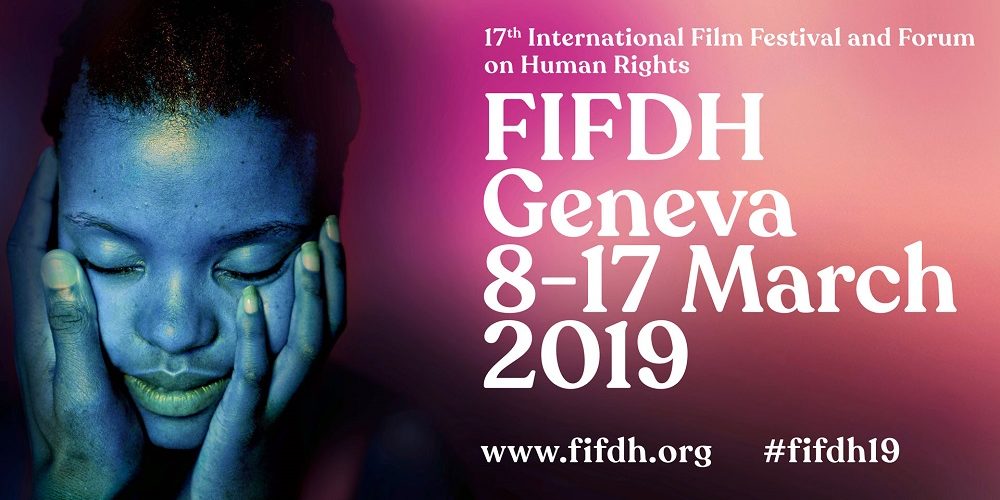
South Sudan: World’s Youngest Nation at the Crossroads to Peace
On Saturday, March 9, Interpeace and the FIFDH will co-host the event: “South Sudan: World’s Youngest Nation at the Crossroads to Peace”. Acclaimed actor and director, Forest Whitaker, will be joined by young activist, Magdalena Nandege, to address peacebuilding issues in South Sudan in a panel discussion moderated by Interpeace’s President, Scott M. Weber. Together they will present the Whitaker Peace & Development Initiative Trailer Film and discuss the most pressing issues of the youngest country in the world – what are the strategies and actions necessary to guarantee peace and prevent human rights violations?
Currently, South Sudan is facing a major crisis with nearly 380,000 deaths and more than 2.4 million refugees and displaced. Forest Whitaker’s NGO, the Whitaker Peace & Development Initiative (WPDI) established the Youth Peacemaker Network in South Sudan in 2012. This programme seeks to strengthen the leadership capacity of former child soldiers, orphans and youth impacted by conflicts and violence in South Sudan. The objective is to empower youth with peacebuilding and conflict management skills. In more than 25 years of peacebuilding experience, Interpeace recognizes the significance of working with youth to build sustainable solutions for peace. The event will be held at Espace Pitoëff – Grande salle at 14:00 on March 9.
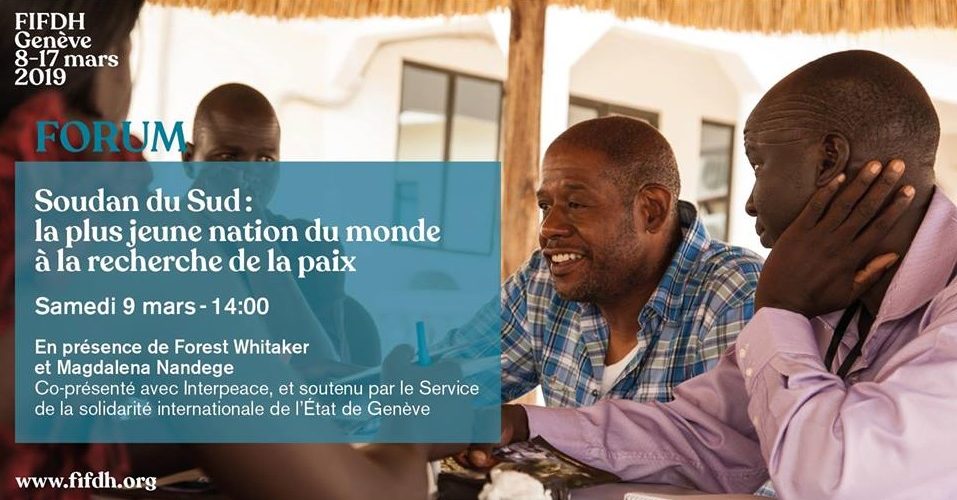
Guatemala: For Memory, Against Impunity
On Sunday, March 17, Interpeace will co-host the event “Guatemala: For Memory, Against Impunity”. Joined by the World Organization Against Torture, Casa Allianza, the Geneva Solidarity Delegation and the Right Livelihood Award, we are proud to present the documentary film Burden of Peace, Directed by Joey Boink from the Netherlands. The film illustrates the work of Guatemala’s first female Attorney General, Claudia Paz y Paz, and her fight against impunity, as she seeks to bring justice to the crimes committed during the armed conflict.
After decades of civil war, Guatemala is still struggling to cope with widespread violence and impunity. The panel discussion for this event will include prominent figures in Guatemala’s political landscape to discuss the current situation on the eve of the presidential elections on June 2019. The panelists include: Iván Velásquez, Commissioner of the International Commission Against Impunity in Guatemala; Juana Baca Velasco, Director of the Ixiles Association of Women’s Organizations; and Lenina García, Secretary General of the Student’s Association of the San Carlos University. The event will be moderated by Arnoldo Gálvez, Global Communications Lead of Interpeace. The event will be held at Espace Pitoëff – Grande salle at 13:30 on March 17.
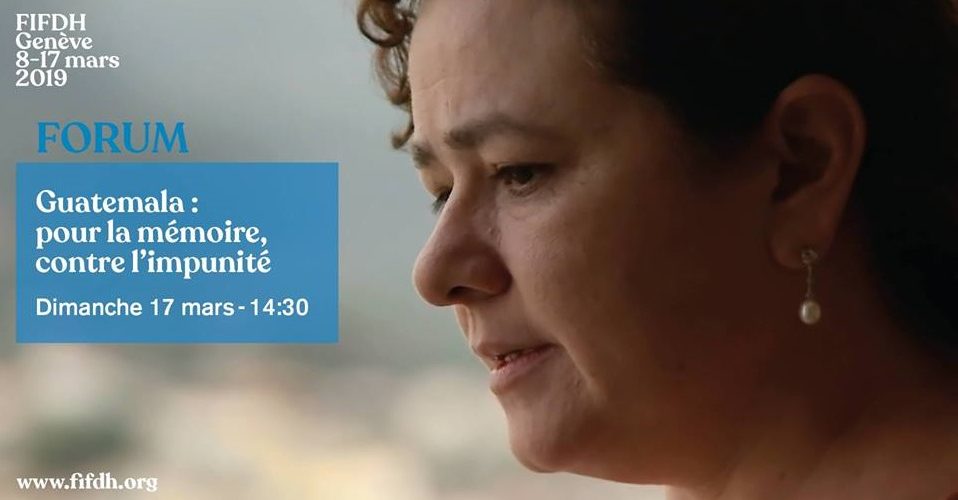
For more information visit www.fifdh.org
Madeline Rose Has Extensive Experience Making the Case for Peace
Geneva, Switzerland, January 22, 2019—The Global Peacebuilding Coalition is a new initiative created by the world’s leading peacebuilding and conflict resolution organizations. In a time of increased violence worldwide, several organizations came together to join efforts and make a global call to action for the prevention of violence and building sustainable peace. Interpeace is thrilled to join this Coalition and work with peacebuilding actors globally. We are pleased to announce Madeline Rose as the Director of the Coalition’s Campaigns and Policy. As Director, Madeline will develop and direct Coalition strategy through public, political, and policy actions to mobilize support for peacebuilding and improve global policies related to peace.
In 2016, with violent conflict at its highest level in 30 years, leaders of the world’s largest peacebuilding organizations met to discuss the urgent need to scale up approaches to peacebuilding. These leaders came away convinced to make the case for peace to the global public and policymakers through collective, outward-facing campaigns. To that end, in 2017, the Global Peacebuilding Coalition was launched, and a major grant from Humanity has strengthened the effort. This investment has paved the way for Coalition work in 2019, starting with the hire of Madeline as Director of Coalition Campaigns and Policy.
Madeline has a strong record of policy, advocacy, and movement-building, as well as deep experience in the peacebuilding field. For the past five years, Madeline served as Senior Global Advocacy Advisor and Senior Policy Advisor at Mercy Corps, where she led advocacy campaigns, as well as global and U.S. government relations on peace and conflict policy. She was the driving force behind the Global Fragility and Violence Reduction Act, which passed the
U.S. House of Representatives in November 2018, as well as a civil society negotiator on major global initiatives including Sustainable Development Goal #16 on Peace, Justice, and Strong Institutions, the Peacebuilding and Sustaining Peace Agenda, and the Secretary General’s Platform for Action on the Prevention of Violent Extremism. Prior to her role at Mercy Corps, Madeline built and managed a global advocacy coalition to prevent mass atrocities in the Central African Republic as lead lobbyist for the Peaceful Prevention of Deadly Conflict program at the Friends Committee on National Legislation.
As a professional staff member on Capitol Hill, Madeline played a lead role in drafting the Women, Peace, and Security Act of 2012, developed the drone warfare oversight strategy for the Congressional Progressive Caucus, and managed the Congressional Ethiopia Caucus, all while serving one of the most diverse Congressional districts in the United States. Madeline has also worked at the United Nations, developed the greenhouse gas reporting approach and Corporate Responsibility framework for a Forbes 500 technology company, and served with community- based organizations in Zimbabwe and South Africa. She has a B.A. from Occidental College in Diplomacy and World Affairs, and is a Seminar XXI U.S. National Security Fellow with Massachusetts Institute of Technology. Madeline is a native of Northern California and will be based in San Francisco.
What People are Saying
“Madeline is a dynamic leader, operating at the highest levels of national and international advocacy, and is endlessly creative in her quest for more effective peacebuilding and humanitarian action. Madeline Rose will be a galvanizing force for the Peacebuilding Coalition at a critical time for mobilizing public action.”
—Melanie Greenberg, Managing Director (Peacebuilding and Conflict Transformation), Humanity United
“The Peacebuilding Coalition could not have hired a more perfect person for its Director of Campaigns and Policy. Madeline is well-respected by all peacebuilding stakeholders—from global grassroots organizations to Members of Congress—and has both the passion and the skills to lead the Coalition to success.”
—Alex Toma, Executive Director, Peace and Security Funders Group
“With conflict fuelling displacement at almost unprecedented levels, and with close to 2 billion people trapped in states of projected fragility, conflict and violence, there has never been a more important time to increase investment in peace-building. Having worked with Madeline for over five years and been inspired by her incredible tenacity, passion, and intelligence whilst raising awareness of the crises in Nigeria and [the Central African Republic] (amongst others), I can think of no one better to step into the role of leading the Coalition at this crucial time.”
—Simon O’Connell, Executive Director, Mercy Corps Europe
Contact Information
The Coalition’s secretariat is housed at the Alliance for Peacebuilding, the leading advocate for non-governmental organizations working for peace around the world. The Coalition’s members include the American Friends Service Committee, Conciliation Resources, the European Peacebuilding Liaison Office, the Global Partnership for the Prevention of Armed Conflict (GPPAC), Humanitarian Dialogue, International Alert, Interpeace, PartnersGlobal, PAX, PeaceDirect, PeaceNexus, Saferworld, and Search for Common Ground.
For more information on the Coalition, please contact:
Sam Danello, Scoville Peace Fellow sam@allianceforpeacebuilding.org
+1 (202) 822-2047 x 214























